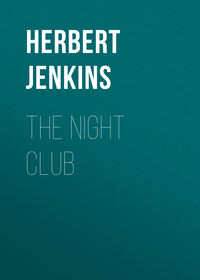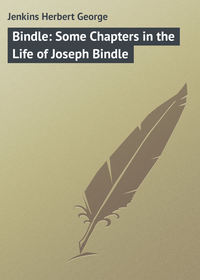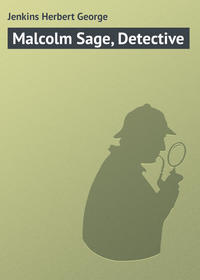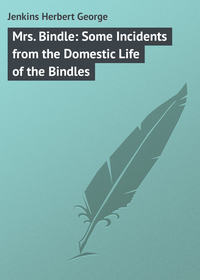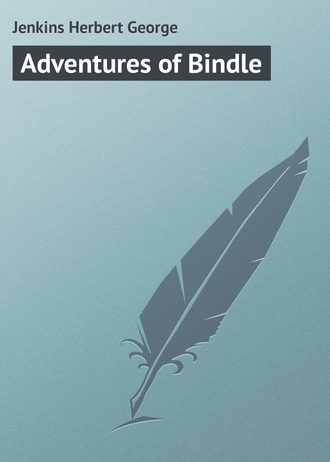 полная версия
полная версияAdventures of Bindle
There were short women and tall women, stout women and thin women, young women and – well, women not so young. The one thing they had in common was lamp-black. It was smeared upon their faces, streaked upon their garments; it had circled their eyes, marked the lines of their mouths, had collected round their nostrils. The heat inside the pantechnicon had produced the necessary moisture upon the fair faces and with this the lamp-black had formed an unholy alliance. Hats were awry, hair was dishevelled, frocks were limp and bedraggled.
The cries of "Votes for Women" that had heralded the triumphant outburst from the van froze upon their lips as the demonstrators caught sight of one another. Each gazed at the others in mute astonishment, whilst Tippitt, from his seat in the middle of the roadway, stared, wondering in a stupid way whether what he saw was the heat, or the five pints of ale he had consumed at Bindle's expense during the morning.
The inspector looked at Bindle curiously, and Bindle looked at the inspector with self-satisfaction, whilst the constables discovered that their unhappy anticipation of a rough and tumble with women, a thing they disliked, had been turned into a most delectable comedy.
At the first-floor window Mr. Llewellyn John watched the scene with keen enjoyment.
For a full minute the women stood gazing from one to the other in a dazed fashion. Finally one with stouter heart than the rest shouted "Votes for Women! This is a woman's war!"
But there was no answering cry from the ranks. Slowly it dawned upon each and every woman that in all probability she was looking just as ridiculous as those she saw about her. One girl produced a small looking-glass from a hand-bag. She gave one glance into it, and incontinently went into hysterics, flopping down where she stood.
The public, conscious that great events were happening in Downing Street, poured into the narrow thoroughfare, and the laughter denied the official police by virtue of discipline was heard on every hand.
"Christy Minstrels, ain't they?" enquired one youth of another with ponderous humour.
It was at the moment that one of them had raised a despairing cry of "Votes for Women," and had received no support.
"Votes for Women!" remarked one man shrewdly. "Soap for Women! is what they want."
"Fancy comin' out like that, even in wartime," commented another.
"'Ow'd they get like that?" enquired a third.
"Oh, you never know them suffragettes," remarked a fourth sagely; "they're always out for doing something different from what's been done before."
"Well, they done it this time," commented a little man with grey whiskers. "Enough to make Gawd 'Imself ashamed of us, them women is. Bah!" and he spat contemptuously.
The inspector felt that the time for action had arrived. Walking up to the unhappy group of twenty, he remarked in his most official tone:
"You cannot stand about here, you must be moving on."
"Moving on; but where?" They looked into each other's eyes mutely. Suddenly an idea seemed to strike them and they turned instinctively to re-enter the van; but Bindle had anticipated this manœuvre, and had carefully closed, barred and padlocked the doors.
The inspector nodded approval. He had formed a very high opinion of Bindle's powers, although greatly puzzled by the whole business. At a signal from their superior, a number of uniformed constables formed up behind the forlorn band of females, several of whom were in tears.
"Move along there, please," they chorused, dexterously splitting up the group into smaller groups, and, finally, into ones and twos. Thus they were herded towards Whitehall.
"Will you call some cabs, please," said she who was obviously the leader. The inspector shook his head, whereat the woman smacked the face of the nearest constable, obviously with the intention of being arrested. Again the inspector shook his head. He had made up his mind that there should be no arrests that day. Nemesis had taken a hand in the game, and the inspector recognized in her one who is more powerful than the Metropolitan Police Force.
Slowly amidst the jeers of the crowd the twenty women were shepherded into Whitehall.
"Oh, please get me a taxi," appealed a little blonde woman with a hard mouth and what looked like a dark black moustache. "I cannot go about like this."
Suddenly one of their number was taken with shrieking hysterics. She sat down suddenly, giving vent to shriek after shriek, and beating a tattoo with the heels of her shoes upon the roadway; but no one took any notice of her and soon she rose and followed the others.
In Whitehall frantic appeals were made to drivers of taxicabs and conductorettes of omnibuses. None would accept such fares.
"It 'ud take a month to clean my bloomin' cab after you'd been in it," shouted one man derisively. "What jer want to get yourself in such a dirty mess for?"
"Go 'ome and wash the baby," shouted another.
Nowhere did the Black and White Raiders find sympathy or assistance. Two of the leaders of the Suffragette Movement, who happened to be passing down Whitehall, were attracted by the crowd. On learning what had happened, and seeing the plight of the demonstrators, they continued on their way.
"This is war-time," one of them remarked to the other, "and they're disobeying the rules of the Association." With this they were left to their fate.
Some made for the Tube, others for the District Railway, whilst two sought out a tea-shop and demanded washing facilities; but were refused. The railway-stations were their one source of hope. For the next three hours passengers travelling to Wimbledon were astonished to see entering the train forlorn and dishevelled women, whose faces were rendered hideous by smears of black, and whose white frocks, limp and crumpled, looked as if they had been used to clean machinery.
"A pleasant little afternoon's treat for you, sir," remarked Bindle to the inspector, when the last of the raiders had disappeared. "Mr. John seemed to enjoy it." Bindle indicated the first-floor window of Number 110, with a jerk of his thumb.
"Was that your doing?" enquired the inspector.
"Well," replied Bindle, "it was an' it wasn't," and he explained how it had all come about.
"And what am I goin' to do with this 'ere van?" he queried.
"Better run it round to 'the Yard,' then you can take home the horses," replied the inspector.
"Right-o!" said Bindle.
"By the way," added the inspector, "I'm coming round myself. I should like you to see Chief-Inspector Gunny."
Bindle nodded cheerily. "'Ullo, Tippy!" he cried, "knocked you down, didn't they?"
Tippitt grinned, he had thoroughly enjoyed the entertainment and bore no malice.
"That's why you got the watering-can, mate?" he remarked.
Bindle surveyed him with mock admiration.
"Now ain't you clever," he remarked. "Fancy you a-seein' that. There ain't no spots on you, Tippy;" whereat Tippitt grinned again modestly.
That afternoon Bindle was introduced to the Famous Chief-Inspector Gunny of Scotland Yard, who, for years previously, had been the head of the department dealing with the suffragist demonstrations. He was a genial, large-hearted man, who had earned the respect, almost the liking of those whose official enemy he was. When he heard Bindle's story, he roared with laughter, and insisted that Bindle should himself tell about the Black and White Raiders to the Deputy-Commissioner and the Chief Constable. It was nearly four o'clock when Bindle left Scotland Yard, smoking a big cigar with which the Deputy-Commissioner had presented him.
Chief-Inspector Gunny's last words had been, "Well, Bindle, you've done us a great service. If at any time I can help you, let me know."
"Now I wonder wot 'e meant by that," murmured Bindle to himself. "Does it mean that I can 'ave a little flutter at bigamy, or that I can break 'Earty's bloomin' 'ead and not get pinched for it. Still," he remarked cheerfully, "it's been an 'appy day, a very 'appy day," and he turned in at The Feathers and ordered "somethink to wet this 'ere cigar."
CHAPTER III
THE AIR-RAID
I"There wasn't no 'ome life in England until the Kayser started a-droppin' bombs in people's back-yards," remarked Bindle oracularly. "Funny thing," he continued, "'ow everybody seemed to find out 'ow fond they was of settin' at 'ome because they was afraid o' goin' out."
Mr. Hearty looked at Mr. Gupperduck and Mr. Gupperduck looked at Mrs. Bindle. They required time in which to assimilate so profound an utterance.
Mr. Gupperduck had firmly established himself in the good graces of Mr. Hearty and the leaders of the Alton Road Chapel. He was a constant visitor at the Heartys', especially at meal times, and at the chapel he prayed with great fervour, beating all records as far as endurance was concerned.
"I don't agree with you," remarked Mr. Gupperduck at length, "I do not agree with you. The Scriptures say, 'Every man to his family.'"
Mr. Hearty looked gratefully at his guest. It was pleasant to find Bindle controverted.
"You know, Alf, you never been so much at 'ome," wheezed Mrs. Hearty, hitting her chest remorselessly. "You never go out on moonlight nights."
"You trust 'im," said Bindle. "'Earty an' the moon ain't never out together."
"We are told to take cover," said Mr. Hearty with dignity.
"An' wot about us pore fellers wot 'as to be out in it all?" demanded Bindle, looking down at his special constable's uniform.
"You should commend yourself to God," said Mr. Gupperduck piously. "He that putteth his trust in Him shall not be afraid."
"Ain't you afraid then when there's a raid on?" demanded Bindle.
"I have no fear of earthly things," replied Mr. Gupperduck, lifting his eyes to the ceiling.
"'E's all Gupperduck an' camelflage, ain't 'e, Millikins?" whispered Bindle to his niece. Then aloud he said: "Well, Mrs. B. ain't like you! She's afraid like all the rest of us. I don't believe much in coves wot say they ain't afraid. You ask the boys back from France. You don't 'ear them a-sayin' they ain't afraid. They knows too much for that."
"There is One above who watches over us all, Joseph," said Mr. Hearty, emboldened to unaccustomed temerity by the presence of Mr. Gupperduck.
"Mr. Bindle," said Mr. Gupperduck, "our lives and our happiness are in God's hands, wherefore should we feel afraid?"
"Well, well!" remarked Bindle, with resignation, "you an' 'Earty beat me when it comes to pluck. When I'm out with all them guns a-goin', an' bombs a-droppin' about, I'd sooner be somewhere else, an' I ain't a-goin' to say different. P'raps it's because I'm an 'eathen."
"The hour of repentance should not be deferred," said Mr. Gupperduck. "It is not too late even now."
"It's no good," said Bindle decisively. "I should never be able to feel as brave as wot you are when there's a raid on."
"'Oh ye of little faith!'" murmured Mr. Gupperduck mournfully.
"Think of Daniel in the lions' den," said Mrs. Bindle. "And Jonah in the – er – interior of the whale," added Mr. Hearty with great delicacy.
"No," remarked Bindle, shaking his head with conviction, "I wasn't made for lions, or whales. I suppose I'm a bit of a coward."
"I don't feel brave when there's a raid, Uncle Joe," said Millie Hearty loyally. She had been a silent listener. "And mother isn't either, are you, mums?" she turned to Mrs. Hearty.
"It's my breath," responded Mrs. Hearty, patting her ample bosom. "It gets me here."
"That's because you don't go to chapel, Martha," said Bindle. "If you was to turn up there three times on Sundays you'd be as brave as wot Mr. Gupperduck is. Ain't that so?" he enquired, turning to Mr. Gupperduck.
"You're always sneering at the chapel," broke in Mrs. Bindle, without giving the lodger time to reply. "It doesn't do us any harm, whatever you may think."
"That's jest where you're wrong, Mrs. B.," remarked Bindle, settling himself down for a controversy. "I ain't got nothink to say against the chapel, if they'd only let you set quiet; but it's such an up an' down sort o' life. When you ain't kneelin' down a-askin' to be saved from wot you know you deserves, or kept from doin' wot you're nuts on doin', you're a-standin' up asingin' 'ymns about all sorts of uncomfortable things wot you says you 'opes to find in 'eaven."
"You have a jaundiced view of religion, Mr. Bindle," said Mr. Gupperduck ponderously. "A jaundiced view," he repeated, pleased with the phrase.
"'Ave I really?" enquired Bindle anxiously. "I 'ope it ain't catchin'. No," he continued meditatively, "I wasn't meant for chapels. I seem to be able to think best about 'eaven when I'm settin' smokin' after supper, with Mrs. B. a-bangin' at the stove to remind me that I ain't there yet."
"Wot does me," he continued, "is that I never yet see any of your chapel coves 'appier for all your singin' an' prayin'. Why is it? Look at you three now! If you was goin' to be plucked and trussed to-morrow, you couldn't look more fidgety."
Instinctively each of the three looked at the other two. Mr. Gupperduck shook his head hopelessly.
"You don't understand, Joseph," murmured Mr. Hearty with mournful resignation.
"I can understand Ruddy Bill gettin' drunk," Bindle continued, "because 'e do look 'appy when 'e's got a skin-full; but I can't understand you a-wantin' to pray, 'Earty, I can't really. I only once see a lot o' religious people 'appy, an' that was when they got drunk by mistake. Lord, didn't they teach me an' ole 'Uggles things! 'E blushes like a gal when I mentions it. 'Uggles 'as a nice mind, 'e 'as.
"Well, I must be goin', 'Earty, in case them 'Uns come over to-night. You ought to be a special, 'Earty, there's some rare fine gals on Putney 'Ill."
"Do you think there'll be an air-raid to-night?" asked Mr. Gupperduck with something more than casual interest in his voice.
"May be," said Bindle casually, "may be not. Funny things, air-raids, they've changed a rare lot o' things," he remarked meditatively. "Once we used to want the moon to come out, sort o' made us think of gals and settin' on stiles. Mrs. B. was a rare one for moons and stiles, wasn't you, Lizzie?"
"Don't be disgusting, Bindle." There was anger in Mrs. Bindle's voice.
"Now," continued Bindle imperturbably, "no cove don't want to go out an' set on a stile a-'oldin' of a gal's 'and: not 'im. When 'is job's done, 'e starts orf for 'ome like giddy-o, an' you don't see 'is nose again till the next mornin'."
Bindle paused to wink at Mr. Hearty.
"If there's any gal now," he continued, "wot wants 'er 'and 'eld on moonlight nights, she'll 'ave to 'old it 'erself, or wait till peace comes."
"If you would only believe, Mr. Bindle," said Mr. Gupperduck earnestly, making a final effort at Bindle's salvation. "'If thou canst believe, all things are possible.' Ah!"
Mr. Gupperduck started into an upright position with eyes dilated as a loud report was heard.
"What was that?" he cried.
"That," remarked Bindle drily, as he rose and picked up his peaked cap, "is the signal for you an' 'Earty to put your trust in Gawd. In other words," he added, "it's a gun, 'im wot Fulham calls 'The Barker.'"
Bindle looked from Mr. Hearty, leaden-hued with fright, to Mr. Gupperduck, whose teeth were chattering, on to Mrs. Bindle, who was white to the lips.
"Well, I must be orf," he said, adjusting his cap upon his head at a rakish angle. "If I don't come back, Mrs. B., you'll be a widow, an' widows are wonderful things. Cheer-o! all."
Bindle turned and left the room, his niece Millie following him out into the passage.
"Uncle Joe," she said, clutching hold of his coat sleeve, "you will be careful, won't you?" Then with a little catch in her voice, she added, "You know you are the only Uncle Joe I've got."
And Bindle went out into the night where the guns thundered and the shrapnel burst in sinister white stabs in the sky, whilst over all brooded the Great Queen of the heavens, bathing in her white peace the red war of pigmies.
IITwo hours later Bindle's ring at the Heartys' bell was answered by Millie.
"Oh, Uncle Joe!" she cried joyfully, "I'm so glad you're back safe. Hasn't it been dreadful?" Her lower lip quivered a little.
"You ain't been frightened, Millikins, 'ave you?" enquired Bindle solicitously.
"A soldier's wife isn't afraid, Uncle Joe," she replied bravely. Millie's sweetheart, Charlie Dixon, was at the front.
"My! ain't we gettin' a woman, Millikins," cried Bindle, putting his arm affectionately round her shoulders and kissing her cheek loudly. "Everybody all right?" he enquired.
"Yes, I think so, Uncle Joe, but," she squeezed his arm, "I'm so glad you're back. I've been thinking of you all the time. Every time there was a big bang I – I wondered – "
"Well, well!" interrupted Bindle, "we ain't goin' to be down-'earted, are we? It's over now, you'll 'ear the 'All Clear' in a few minutes."
Bindle walked into the Heartys' parlour, where Mrs. Hearty was seated on the sofa half asleep.
"'Ullo, Martha!" he cried.
"Ah! Joe," she said, "I'm glad you're back. I'm afraid there's been a lot of – " Her breath failed her, and she broke off into a wheeze.
Bindle looked about him curiously.
"'Ullo! wot's 'appened to them three little cherubs?" he enquired.
Mrs. Hearty began to shake and wheeze with laughter, and Millie stood looking at Bindle.
"Wot's 'appened, Millikins?" he enquired. "Done a bunk, 'ave they?"
"They're – they're in the potato-cellar, Uncle Joe," said Millie without the ghost of a smile. Somehow it seemed to her almost like a reflection on her own courage that her father and aunt should have thought only of their personal safety.
Bindle slapped his leg with keen enjoyment. "Well, I'm blowed!" he cried, "if that ain't rich. Three people wot was talkin' about puttin' their trust in Gawd a-goin' into that little funk-'ole. Well, I'm blowed!"
"Don't laugh, Uncle Joe," began Millie, "I – I – " She broke off, unable to express what was in her mind.
"Don't you worry, Millikins," he replied as he moved towards the door. "I'd better go and tell 'em that it's all right."
Mr. Hearty's potato-cellar was reached through a trap-door flush with the floor of the shop.
With the aid of an electric torch, Bindle looked about him. His eyes fell on a large pair of scales, on which were weights up to 7 lbs. This gave him an idea. Carefully placing a box beside the trap-door, he lifted the scales and weights in his arms and, with great caution, mounted on to the top of the box. Suddenly he let the scales and weights fall with a tremendous crash, full in the centre of the trap-door, at the same time giving vent to a shout. Millie came running in from the parlour.
"Oh! Uncle Joe, what has happened?" she cried. "Are you hurt?"
"It's all right, Millikins, knocked over these 'ere scales I did. Ain't I clumsy? 'Ush!"
Moans and cries could be distinctly heard from below.
"'Ere, 'elp me gather 'em up, Millikins. I 'ope I 'aven't broken the scales."
Having replaced the scales and weights on the counter, Bindle proceeded to pull up the trap-door.
"All clear!" he shouted cheerily.
There was no response, only a moaning from the extreme corner of the cellar.
"'Ere, come along, 'Earty. Wot d'you two mean by takin' my missis down into a cellar like that?"
"Is it gone?" quavered a voice that Bindle assumed must be that of Mr. Gupperduck.
"Is wot gone?" he enquired.
"The bomb," whispered the voice.
"Oh, come up, Gupperduck," said Bindle. "Don't play the giddy goat in the potato-cellar. Wot about you puttin' your trust in Gawd?"
There was a sound of movement below. A few moments later Mr. Gupperduck's face appeared within the radius of light. He had lost his spectacles and his upper set of false teeth. His hair was awry and his face distorted with fear. He climbed laboriously up the steps leading to the shop. He was followed by Mr. Hearty, literally yellow with terror.
"Wot 'ave you done with my missis?" demanded Bindle.
"She – she – she's down there," stuttered Mr. Gupperduck.
"Then you two jolly well go down and fetch 'er up, or I'll kick you down," cried Bindle angrily. "Nice sort of sports you are, leavin' a woman alone in an 'ole like that, after takin' er down there."
Mr. Hearty and Mr. Gupperduck looked at Bindle and then at each other. Slowly they turned and descended the ladder again. For some minutes they could be heard moving about below, then Mr. Hearty appeared with Mrs. Bindle's limp form clasped round the waist, whilst Mr. Gupperduck pushed from behind.
For one moment a grin flitted across Bindle's features, then, seeing Mrs. Bindle's pathetic plight, his manner changed.
"'Ere, Millikins, get some water," he cried. "Your Aunt Lizzie's fainted."
Between them they half-carried, half-dragged Mrs. Bindle into the parlour, where she was laid upon the sofa, vacated by Mrs. Hearty. Her hands were chafed, water dabbed upon her forehead, and a piece of brown paper burned under her nose by Mrs. Hearty.
She had not lost consciousness; but stared about her in a vague, half-dazed fashion.
Mr. Hearty and Mr. Gupperduck, who had retrieved his false teeth, seemed thoroughly ashamed of themselves. It was Mr. Hearty who suggested that Mrs. Bindle should spend the night with them, as she was not in a fit condition to go home.
As he spoke, the "All Clear" signal rang out joyfully upon the stillness without, two long-drawn-out notes that told of another twenty-four hours of safety. Mr. Gupperduck straightened himself, Mr. Hearty seemed to revive, and from Mrs. Bindle's eyes fled the expression of fear.
"Well, I must be orf," said Bindle. "Look after my missis, 'Earty. You comin' along, Mr. G.?" he enquired of Mr. Gupperduck, as, followed by Millie, he left the room.
"It was sweet of you not to laugh at them, Uncle Joe," said Millie, as they stood at the door waiting for Mr. Gupperduck.
"Nobody didn't ought to mind sayin' they're afraid, Millikins," said Bindle, looking at the serious face before him; "but I don't like a cove wot says 'e's brave, an' then turns out to 'ave about as much 'eart as a shillin' rabbit. Come along, Mr. G. Good night, Millikins, my dear. Are we down-'earted? No!" and Bindle went out into the night, followed by a meek and chastened Mr. Gupperduck.
CHAPTER IV
THE DUPLICATION OF MR. HEARTY
I"You've never been a real husband to me," burst out Mrs. Bindle stormily.
Bindle did not even raise his eyes from his favourite dish of stewed-steak-and-onions.
"Cold mutton," he had once remarked to his friend, Ginger, "means peace, because I don't like it – the mutton, I mean; but stewed-steak-and-onions means an 'ell of a row. Mrs. B. ain't able to see me enjoyin' myself but wot she thinks I'm bein' rude to Gawd."
Bindle continued his meal in silent expectation.
"Look at you!" continued Mrs. Bindle. "Look at you now!"
Bindle still declined to be drawn into a discussion.
"Look at Mr. Hearty." Mrs. Bindle uttered her challenge with the air of one who plays the ace of trumps.
With great deliberation Bindle wiped the last remaining vestige of gravy from his plate with a piece of bread, which he placed in his mouth. With a sigh he leaned back in his chair.
"Personally, myself," he remarked calmly, "I'd rather not."
"Rather not what?" snapped Mrs. Bindle.
"Look at 'Earty," was the response.
"You might look at worse men than him," flashed Mrs. Bindle with rising wrath.
"I might," replied Bindle, "and then again I might not."
"Look how he's got on!" challenged Mrs. Bindle.
After a few moments of silence Bindle remarked more to himself than to Mrs. Bindle:
"Gawd made me, an' Gawd made 'Earty; but in one of us 'E made a bloomer. If I'm right, 'Earty's wrong; if 'Earty's right, I'm wrong. If they 'ave me in 'eaven, they won't want 'Earty; an' if 'Earty gets in, well, they won't look at me."
Mrs. Bindle proceeded to gather up the plates.
"Thank you for that stoo," said Bindle as he tilted back his chair contentedly.
"You should thank God, not me," was the ungracious retort.
For a moment Bindle appeared to ponder the remark. "Some'ow," he said at length, "I don't think I should like to thank Gawd for stewed-steak-an'-onions," and he drew his pipe from his pocket and began to charge it.


